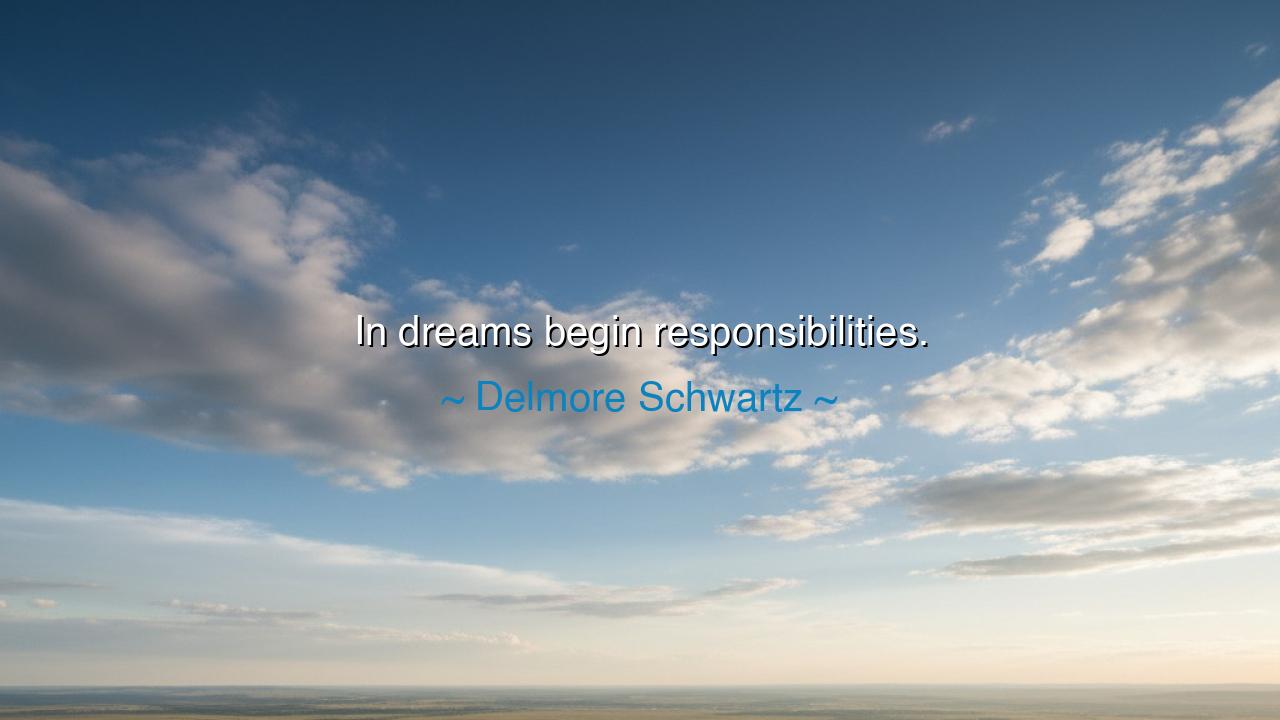
In dreams begin responsibilities.






When Delmore Schwartz wrote, “In dreams begin responsibilities,” he spoke as one who had seen the trembling border between vision and duty, between the radiant fire of imagination and the weight of reality that follows. These five words, brief as lightning, contain the wisdom of centuries: that every dream we dare to hold is not a gift alone—it is a summons. For to dream is to awaken obligation; to imagine a better world is to bind oneself to the labor of bringing it forth.
This quote first appeared as the title of Schwartz’s short story, published in 1937. The tale is surreal, beginning with a dream in which the narrator watches his parents’ courtship unfold on a movie screen. As he sees the choices that will shape his own birth and life, he cries out for them to act differently, to see the consequences he can already foresee. And then, he wakes. The story—part dream, part confession—reflects Schwartz’s belief that awareness brings responsibility. Once one perceives the connection between desire, action, and outcome, innocence is lost. To dream is to see beyond the present; to see beyond the present is to become answerable for what one has seen.
In the voice of the ancients, we might say: “The gods give vision not as a crown, but as a test.” When the seer in old myth glimpses the future, he is forever changed. So it is with us when we dream. Whether the dream is of love, of art, of justice, or of greatness—it demands something of us. The poet cannot dream of truth and then refuse to speak it; the leader cannot imagine freedom and then shrink from its cost. The moment a dream enters the heart, responsibility is born—to act, to serve, to strive toward that vision until it breathes in the world of flesh and time.
History abounds with those who understood this sacred bond between dream and duty. Consider Martin Luther King Jr., who spoke the immortal words, “I have a dream.” His dream was not fantasy—it was a covenant, a moral vow. He knew that to dream of equality meant to endure struggle, imprisonment, and danger. He bore that burden willingly, for he understood what Schwartz meant: that a dream is not an escape from life, but a call to transform it. The dreamer who does not act betrays his own vision; but the one who acts honors both the dream and the divine spark from which it came.
Thus, the wisdom of Schwartz reaches beyond the page—it speaks to all who imagine anything noble or beautiful. Do not mistake dreaming for idleness, nor reverie for retreat. To dream truly is to take upon yourself the duty of the creator, the weight of bringing light into darkness. Every invention, every work of art, every revolution begins in a dream—but the dream is only the seed. It is through discipline, courage, and persistence that it grows into reality. The world does not change through vision alone; it changes when vision gives birth to action.
Let each of us, then, reflect on the dreams we carry within. Do they lift us toward goodness? Do they call us to labor, to compassion, to truth? If so, let us not shrink from them. For the ancients would remind us: the dream is not yours by chance—it is entrusted to you. The responsibility that begins with the dream is the very purpose of your life, the thread by which the universe weaves its meaning through your hands.
So remember Delmore Schwartz’s eternal teaching: “In dreams begin responsibilities.” Guard your dreams, not as toys of fancy, but as sacred trusts. Act upon them with humility and strength. For every dream that stirs within you is both a gift and a burden—a whisper of destiny calling you to build what only you can imagine. And when you answer that call, when you rise to your responsibility, your dream will cease to be mere vision—it will become truth made manifest, and through it, the world itself will be renewed.






AAdministratorAdministrator
Welcome, honored guests. Please leave a comment, we will respond soon